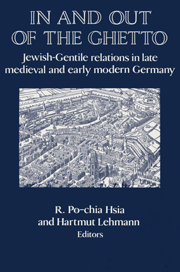Book contents
- Frontmatter
- Reflecting on German-Jewish History
- Part I The Legacy of the Middle Ages: Jewish Cultural Identity and the Price of Exclusiveness
- Part II The Social and Economic Structure of German Jewry from the Fifteenth through the Eighteenth Centuries
- Part III Jewish-Gentile Contacts and Relations in the Pre-Emancipation Period
- Part IV Representations of German Jewry Images, Prejudices, and Ideas
- Part V The Pattern of Authority and the Limits of Toleration: The Case of German Jewry
- Part VI Through the Looking Glass: Four Perspectives on German-Jewish History
- 19 Germany and Its Jews: A Changing Relationship
- 20 The Jewish Minority and the Christian Majority in Early Modern Central Europe
- 21 The Jews of the Netherlands in the Early Modern Period
- 22 Jewish Identity in a World of Corporations and Estates
- Index
19 - Germany and Its Jews: A Changing Relationship
Published online by Cambridge University Press: 05 January 2013
- Frontmatter
- Reflecting on German-Jewish History
- Part I The Legacy of the Middle Ages: Jewish Cultural Identity and the Price of Exclusiveness
- Part II The Social and Economic Structure of German Jewry from the Fifteenth through the Eighteenth Centuries
- Part III Jewish-Gentile Contacts and Relations in the Pre-Emancipation Period
- Part IV Representations of German Jewry Images, Prejudices, and Ideas
- Part V The Pattern of Authority and the Limits of Toleration: The Case of German Jewry
- Part VI Through the Looking Glass: Four Perspectives on German-Jewish History
- 19 Germany and Its Jews: A Changing Relationship
- 20 The Jewish Minority and the Christian Majority in Early Modern Central Europe
- 21 The Jews of the Netherlands in the Early Modern Period
- 22 Jewish Identity in a World of Corporations and Estates
- Index
Summary
The study of German Jewry in the late medieval and early modern eras is of central importance for our grasp of European Jewish history more generally. Germany was the only country in western and central Europe, apart from the northern half of Italy, where Jewish existence and Jewish culture were continuous from the High Middle Ages to the Enlightenment. Whereas from the eighteenth century onward Italian Jewry became more or less a secondary component of European Jewry, German Jewry was crucially and centrally significant throughout this period.
The essays collected in this volume reveal that much disagreement still exists about the nature of the transition that German Jewry underwent in the fifteenth, sixteenth, and seventeenth centuries. Several of the essays concentrate on the religious and theological drama, emphasizing the unique character and intensity of the confrontation between Christianity and Judaism in Germany when compared with other major European countries. This intensity and complexity of the Christian-Jewish encounter in the German lands was partly owing to the continuity of the Jewish presence throughout the long period under consideration. But it was also a consequence of the crisis that beset Christianity in Germany itself, that is, a consequence of the tensions and fragmentation of the Reformation.
- Type
- Chapter
- Information
- In and out of the GhettoJewish-Gentile Relations in Late Medieval and Early Modern Germany, pp. 295 - 304Publisher: Cambridge University PressPrint publication year: 1995



